Follow Community Transit's sustainability journey, from its founding to today and beyond. Scroll the timeline below and click on an item to learn more about our sustainability efforts.
1976
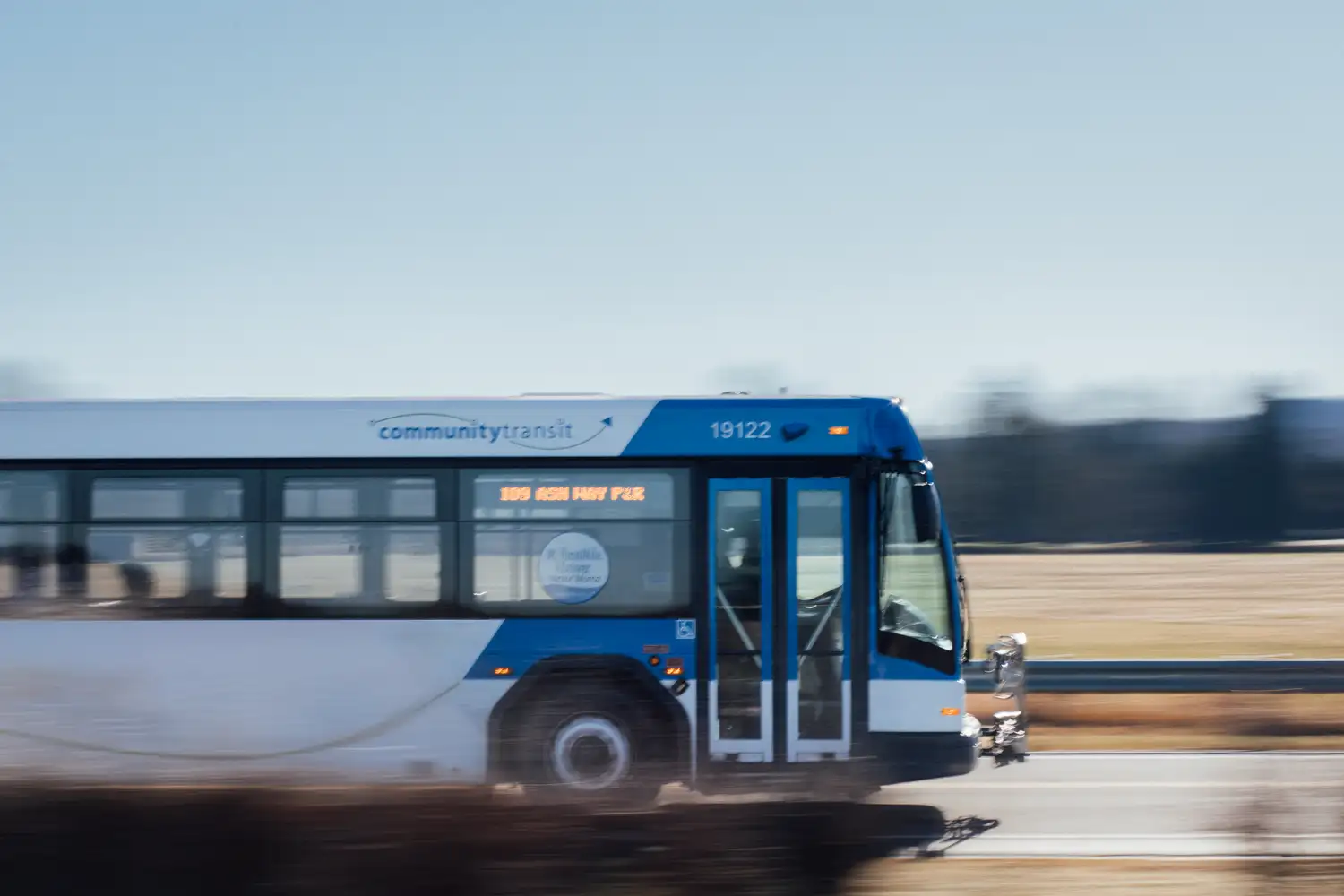
In 1976, Snohomish County Public Transit Benefit Authority (SCPTBA), also known as Community Transit began service with 18 leased buses on seven routes serving Brier, Edmonds, Lynnwood, Marysville, Mountlake Terrace, Snohomish and Woodway.
1981
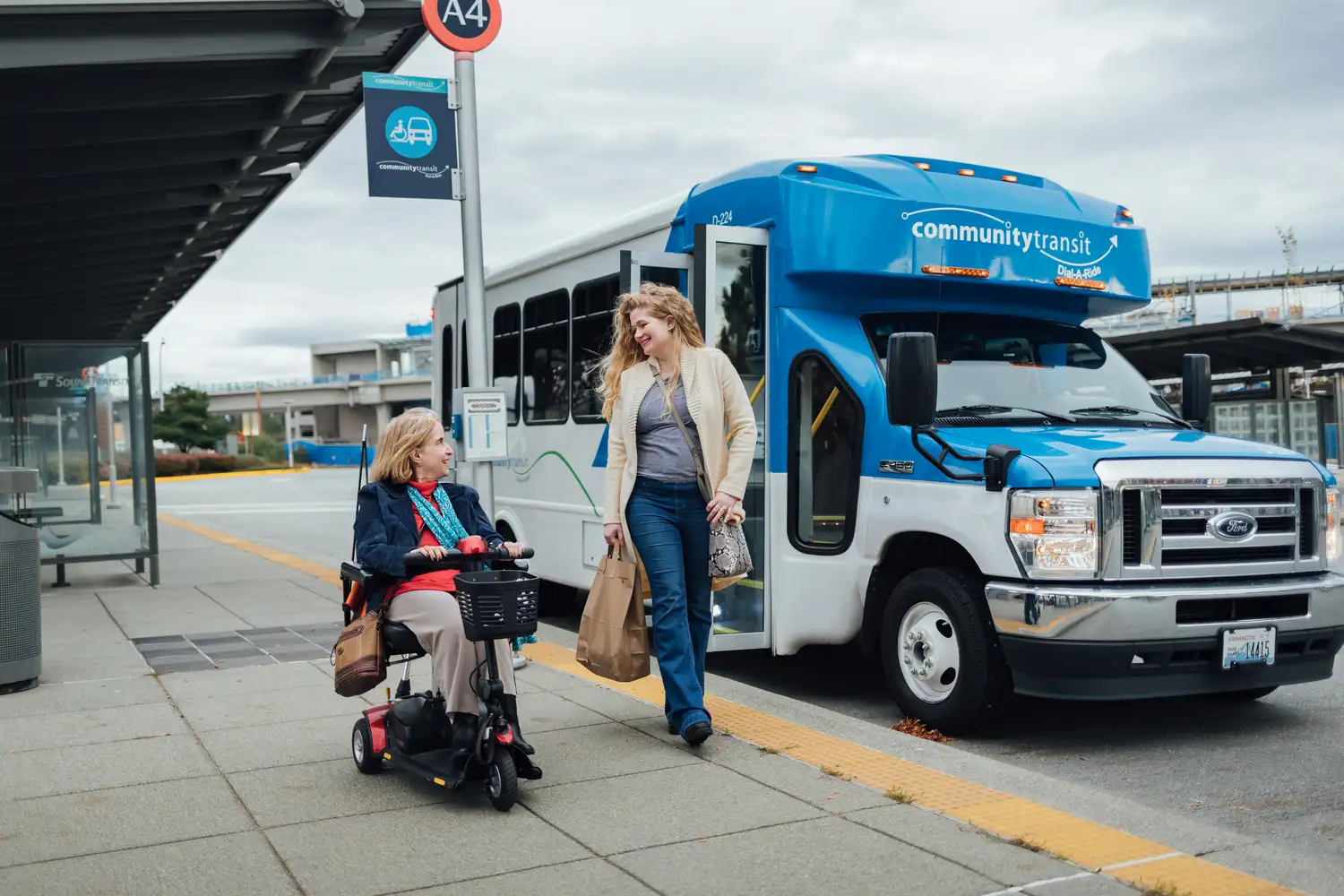
In 1981, service for elderly and disabled riders began with Dial-A-Ride Transit (DART), offering paratransit service for people who cannot access or use Community Transit’s fixed-route bus service because of their disabilities.
1995
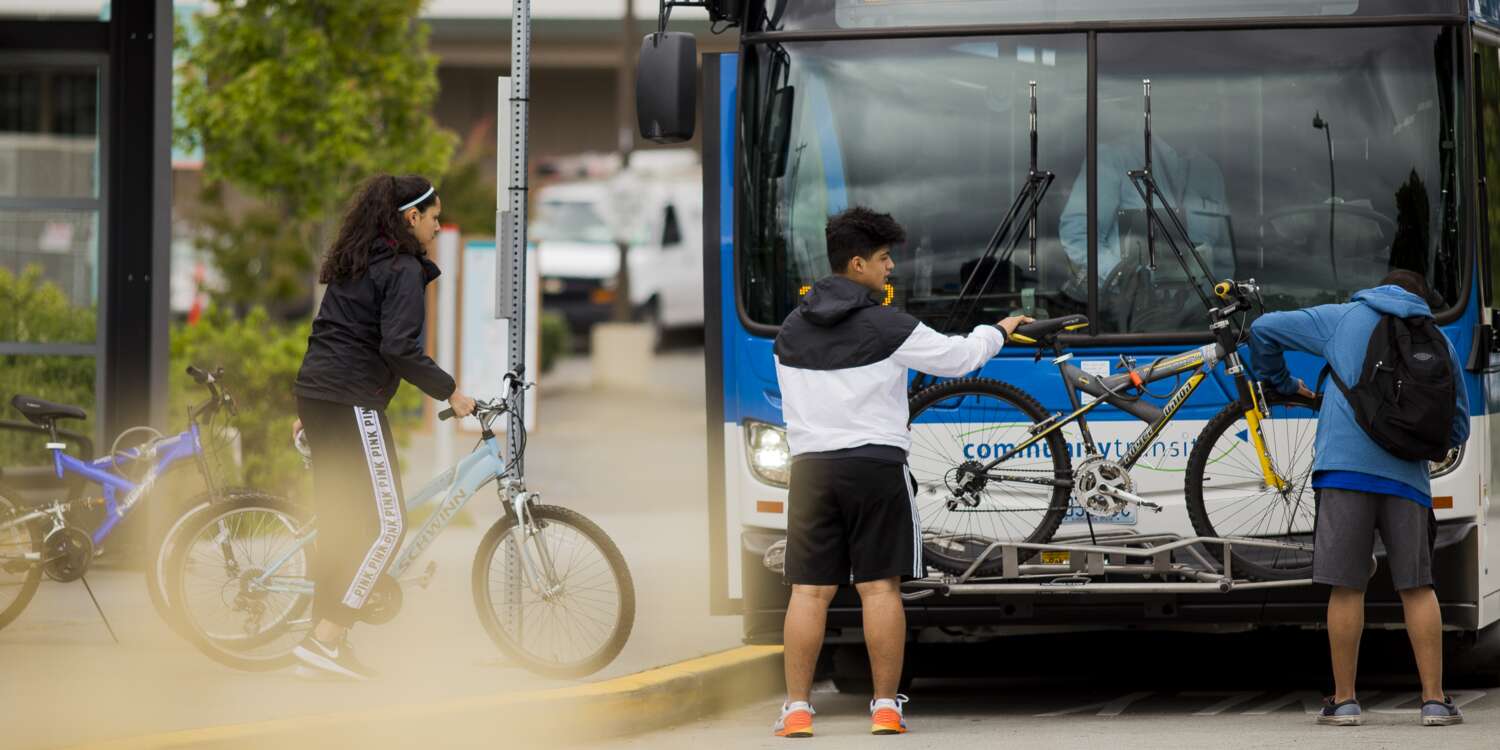
In 1995, Community Transit installed bike racks on all buses, increasing commute flexibility and convenience by making it easier for people to combine cycling with public transit. This allows riders to travel longer distances, navigate hilly or less bike-friendly areas, and have more options for their first and last miles.
1999
In 1999, Community Transit introduced the nation’s first fully accessible low-floor articulated bus, a huge accessibility milestone for those with mobility devices using our service.
2007
In 2007, Community Transit developed an agency-wide and FTA-sponsored Environmental Management System (EMS) Program. The FTA-sponsored program became ISO 14001-2004-Compliant in 2004. The program included outside audits performed every-other year.
2009
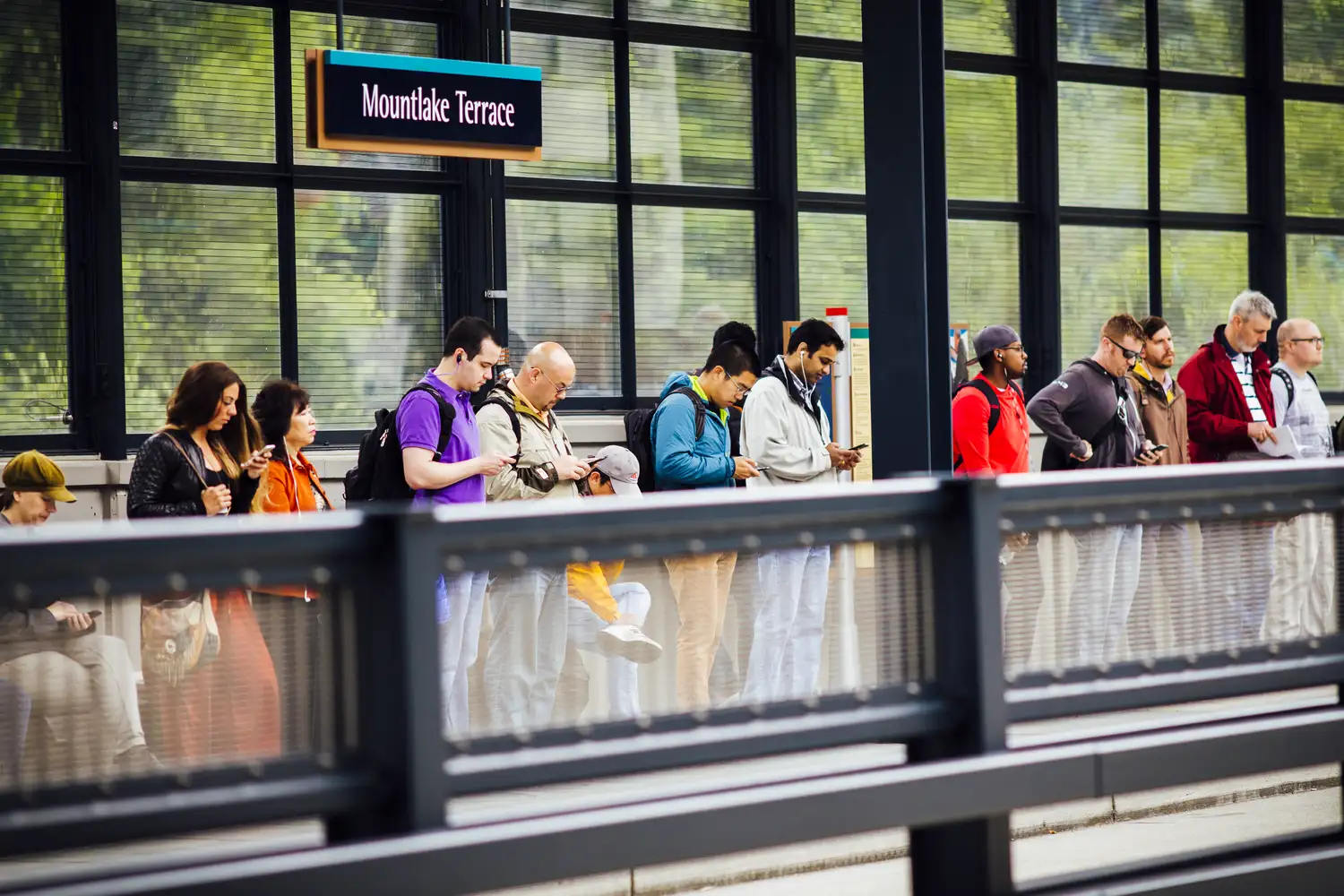
In 2009, Mountlake Terrace Transit Center earned Green Globes "One Globe" Certification and received an incentive payment from PUD for solar panels. CT was also awarded the WACA Design/Construction Award and was featured in the Solarpedia Publication.
2010
The City of Mountlake Terrace partnered with CT in 2010 to win a grant to install 10 EV Chargers at the Mountlake Terrace Transit Center, with the capacity to charge 20 vehicles at a time. This initiative was part of Senator Patty Murray’s US Hwy I-5 Electric Corridor initiative.
2015
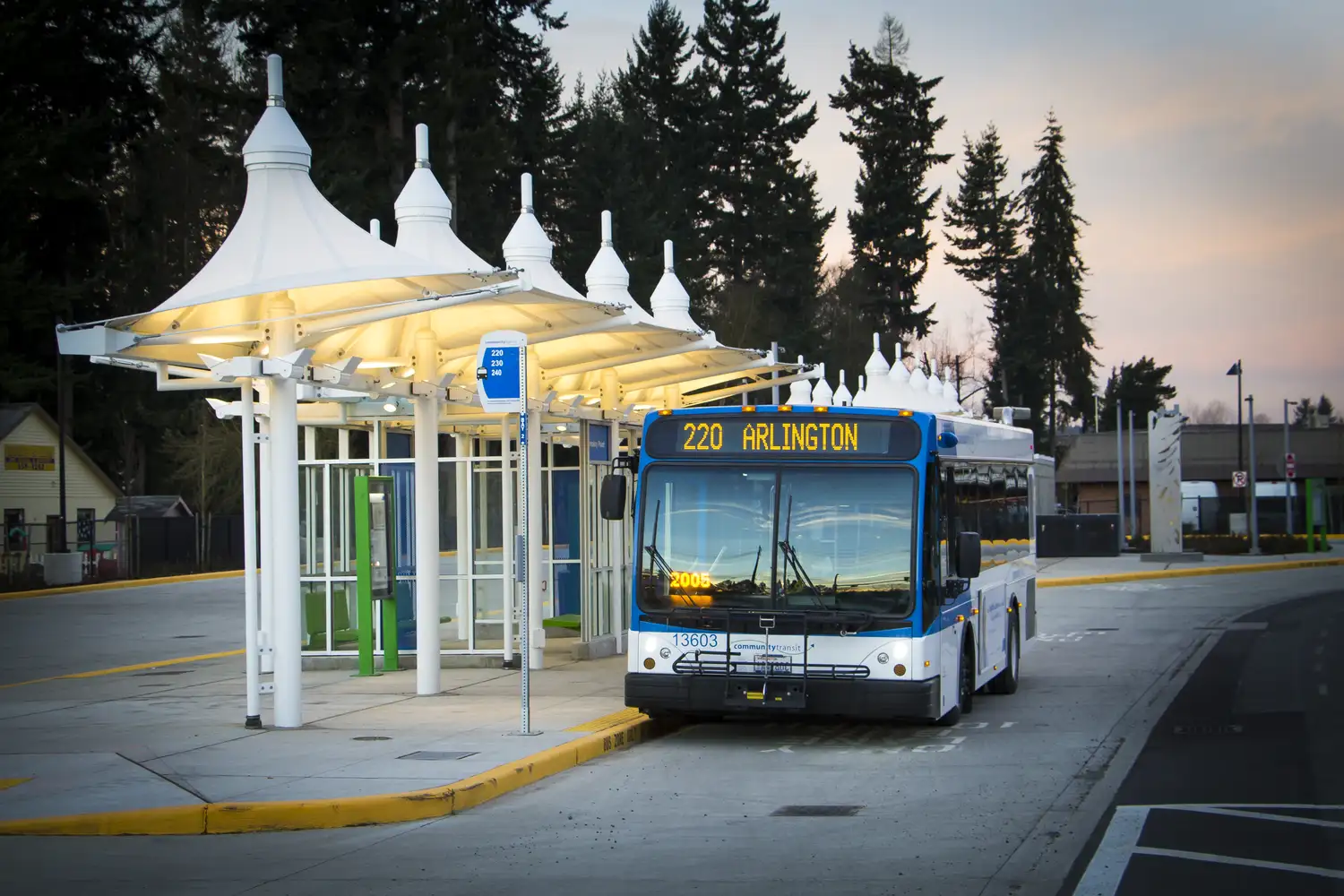
In 2015, Smokey Point Transit Center was awarded Greenroads Silver Certification for the sustainable design and construction features in the project. Some of the sustainable attributes included informational signage, stormwater treatment, and use of sustainable materials.
2020
In 2020, Seaway Transit Center received an FTA WA State Regional Mobility Grant and was awarded Greenroads Silver Certification.
2021

The 2021 design and construction of the Cascade Administrative Building included numerous sustainable features in its design and construction, including materials reuse, integration of skylights, indoor plants, etc.
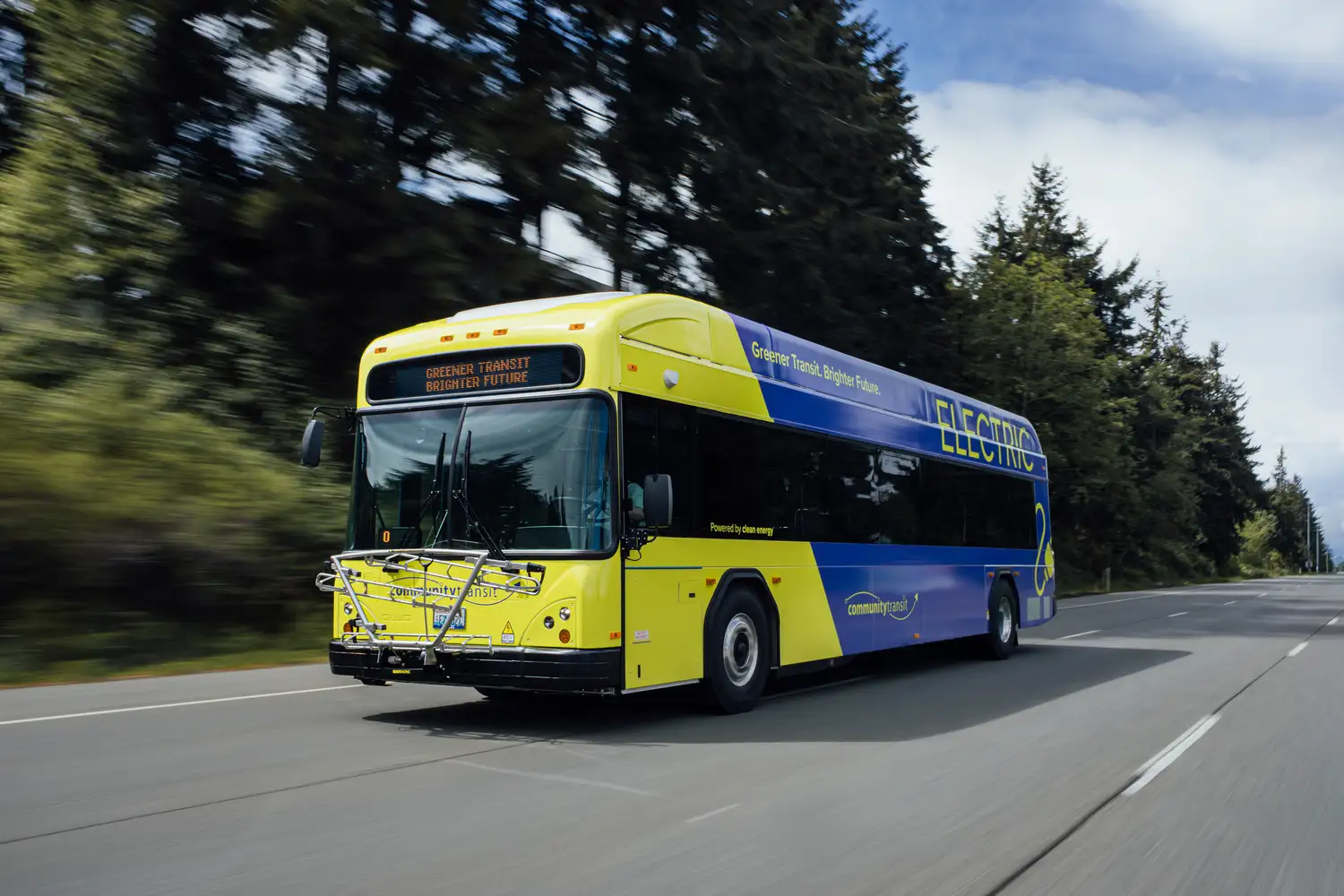
In 2007, CT began the procurement of hybrid service vehicles and hybrid electric buses. In 2024, we reaffirmed this commitment to a more environmentally friendly fleet, with the purchase of one pilot Battery Electric Bus, one hydrogen fuel cell bus, and 25 hybrid vehicles for the Vanpool Program.
Community Transit has undertaken a series of logically sequenced initiatives to develop its Zero Emission Fleet Program, beginning with a Feasibility Study in 2021. The study informed the Board of Directors’ recommendations for the fleet replacement plan and the program was officially created in 2022 as commitment to transition the fleet. In 2022, the agency bridged the gap between feasibility study and active initiatives, with the deployment of a leased 60' battery-electric pilot bus, and purchase of two 40' pilot buses, one battery-electric (BEB) and one fuel cell electric (FCEB), for side-by-side comparison. 2024 marks the first year of ZEB revenue service, with the BEB and FCEB entering service, side-by-side, towards the end of the year. The Zero Emissions Program team continuously gathers input and produces transition modeling to inform strategic fleet transition decisions with the key pillars of People, Process, and Prosperity front of mind. In 2024, The Board of Directors also approved the purchase of five electric vehicles to support this transition within the Vanpool Program.
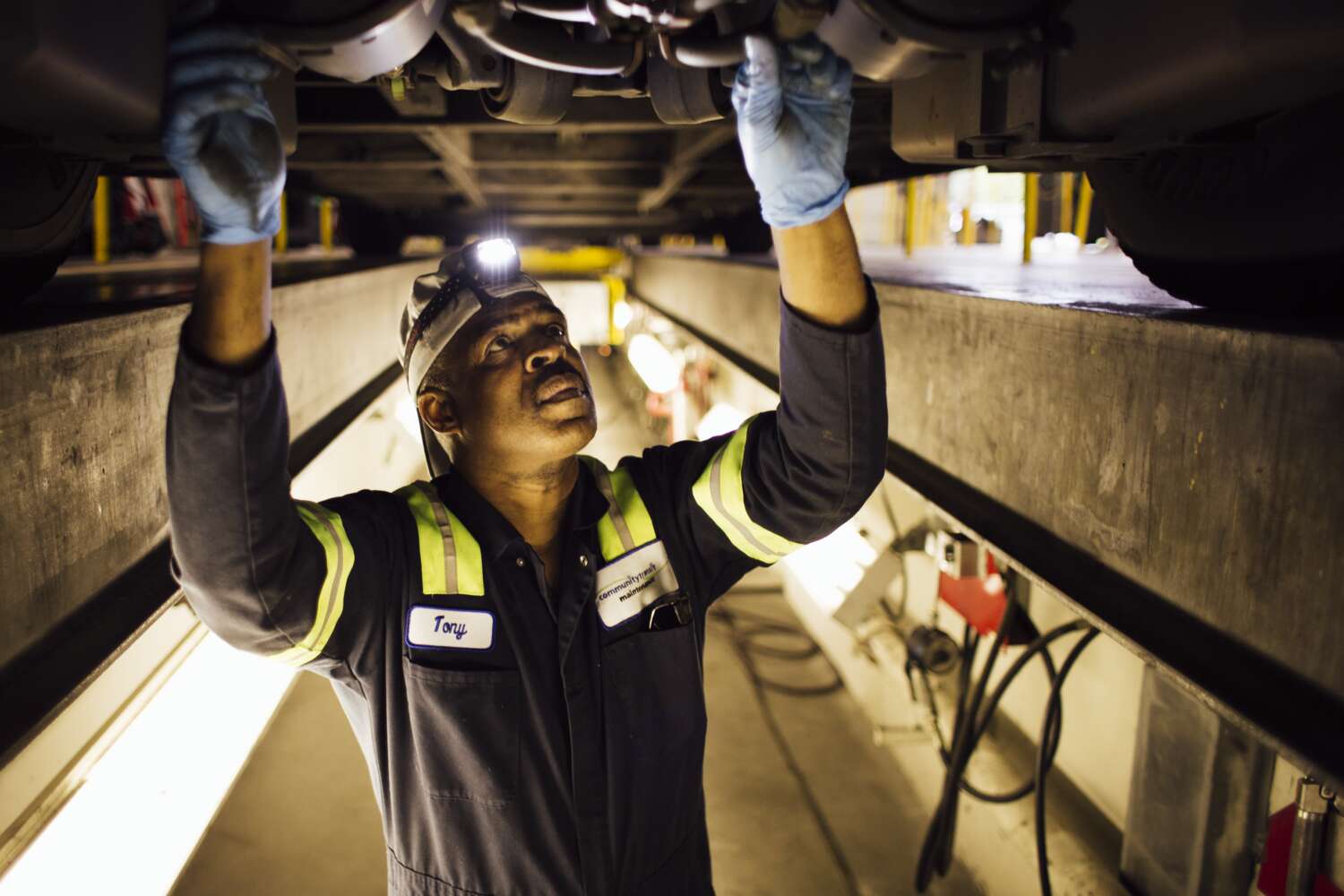
The Community Transit apprenticeship program for Journey Level Mechanics provides opportunities for CT employees to upskill to higher wage jobs while helping ensure the company’s ability to retain a skilled workforce.
In 2021, Communications launched Interact as a way for employees to receive agency news, events, and stories on their computers or smart phones.
This communication channel is more effective at reaching all employees than email or print newsletters/fliers, particularly among drivers, many of whom do not have a company email. That is an organizationally sustainable move. In addition, Interact replaced the Community Times and Behind the Wheel bi-weekly newsletters which were both emailed and printed out for employees. Many paper copies were immediately discarded, creating unneeded waste. Launching Interact was both an environmentally and organizationally sustainable action.
The Diversity, Equity and Inclusion (DEI) Program was created in 2021, with the focus of embedding diversity, equity, inclusion and belonging into our policies, practices and resources. The goal of the DEI program is to create an environment where everyone has opportunities to fully participate and thrive. In 2023, the DEI Program was made into its own division under the Employee Engagement department within the agency, solidifying our commitment to integrating diversity, equity, inclusion and belonging as an integral core value.
During the COVID-19 pandemic, transit agencies nationwide experienced a shortage of drivers. CT looked at its recruitment and hiring practices and made significant changes to how it advertised for driver positions, as well as the application and interview processes. As a result, hiring increased and the agency fulfilled its ranks in order to meet service expansion requirements.
2022
Our updated 2022 Remote Work Policy significantly enhances employee support by promoting a healthier work-life balance. By allowing flexibility in work environments, we recognize that individuals thrive in different settings, fostering a more inclusive atmosphere. This autonomy enables employees to manage their time effectively, reducing stress and allowing for better integration of personal and professional commitments. As a result, many employees feel more motivated and engaged in their work, knowing they can structure their days to suit their needs. The emphasis on remote work also strengthens communication and collaboration through digital tools, reinforcing a culture of trust and accountability.
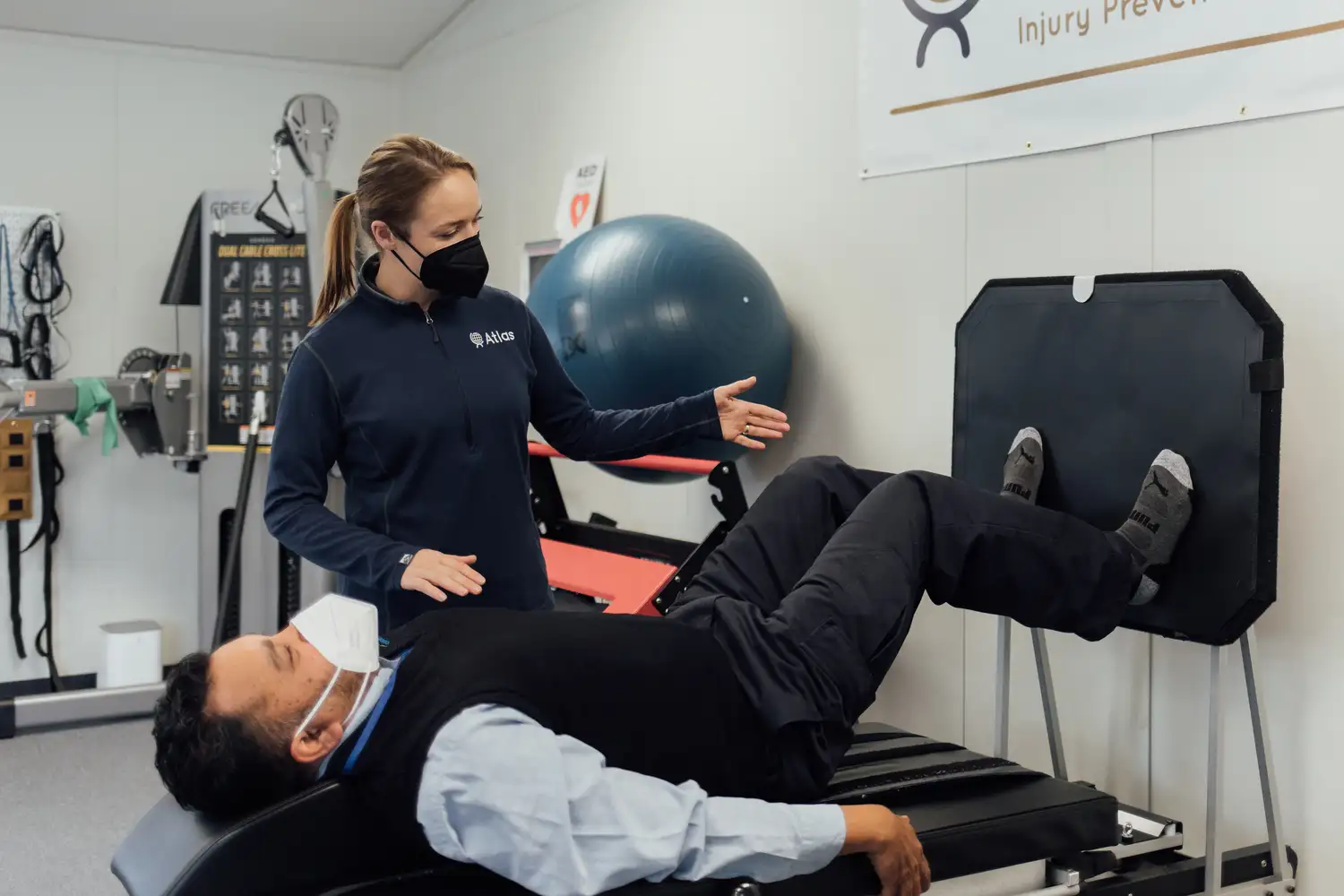
Atlas is the Community Transit wellness program that offers onsite and video consultation for physical therapy, injury prevention, personal training, fitness, yoga, nutrition counseling, and wellness.
- By the end of 2023, following the opening back up of services post-pandemic, Atlas was able to provide injury, pain and preventive care to 39% of Community Transit’s workforce.
- The numbers in 2024 show that this has continued to expand.
- Employees who sought help reported an increase in functionality from 66% to 91%; reliance on medications went from 29% to 7%, with 30% of those still taking medications reporting taking less. Absenteeism due to symptoms went from 7% reporting missing work to 0%.
- Results were achieved in an average of 3 visits, with 78% of employees resolving their issues within 2 months. 29% of people seen for care progressed to using other Atlas services, including the gym, 1:1 trainers and health challenges.
Community Transit’s Employee Assistance Plan (EAP) provider, Wellspring EAP, realized that the shortage of mental health professions was impacting employees’ ability to obtain services, and expanded into offering tele-medicine opportunities and grown services through new providers such as Talkspace. This has brought equity of care to staff in the field, who cannot always get away to in-person wellness appointments.
2023
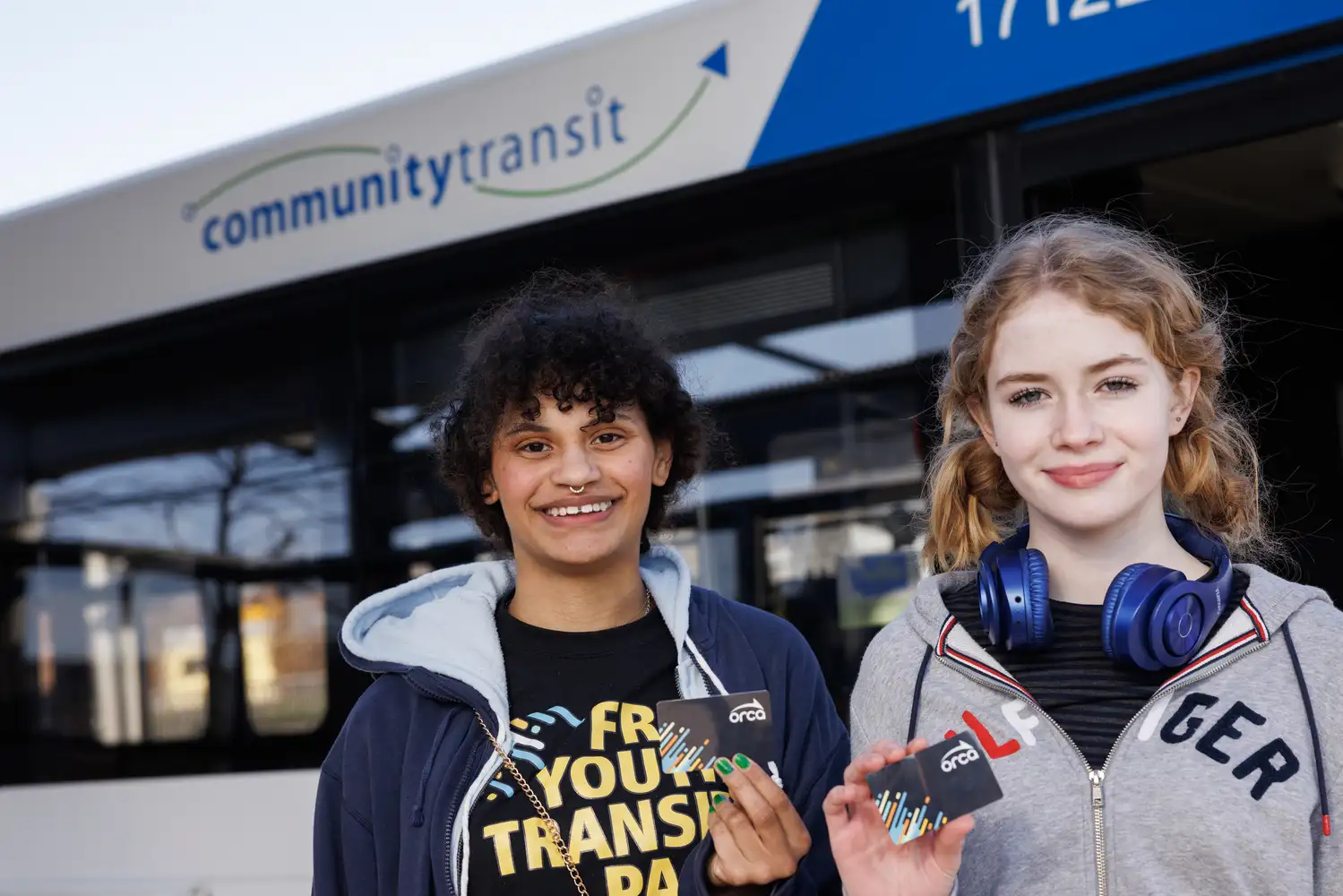
In September 2023, CT created a free youth policy to encourage more transit use by youth aged 18 and under. This policy is aimed at driving more youth transit use, which is both an environmentally and organizationally sustainable action.
We estimate that youth make up somewhere between 15% to 25% of our boardings. Between January-August of 2023 compared to the same date range in 2024, we estimate youth boardings have increased by 56%.
In 2023, we began implementing composting and specialty recycling at all staff events. In addition, we have stationed “waste bin educators” to staff the waste stations and help guide attendees to sort their waste properly. These efforts have helped to increase our waste diversion rates and shifted the culture of waste disposal across the agency.
The implementation of Lattice Performance Management Platform in 2023 and our new performance review practices has transformed our review process into a more holistic and equitable approach. Features like 360-degree feedback and direct report assessments provide deeper insights and enhance accountability for both employees and managers. Previously, our reviews relied solely on manager evaluations, but the new system allows employees to identify peers for feedback, fostering collaboration and open communication.
Additionally, the transition from a 5-point scale to a nine-box scale allows us to assess not only results but also how employees embody our core values. This emphasis on performance and values promotes a more comprehensive understanding of success within our organization. Ultimately, these enhancements empower employees, improve manager support, and contribute to a culture of continuous improvement within Community Transit.
2024
Over 2024, Community Transit’s Employee Engagement department has focused on developing consistent job descriptions, which has been a foundational step toward enhancing clarity and alignment within our organization. One of the most significant advancements has been the creation of job ladders, promoting transparency and equity, and serving as a roadmap for employee development. By establishing clear criteria for advancement, we empower employees to understand their career trajectories and the skills needed to progress within the company.
In addition to job ladders, our equity reviews play a crucial role in ensuring fair compensation practices. These reviews allow us to assess and compare salaries for both current employees and new hires, ensuring that everyone is compensated fairly and equitably. This ongoing examination of salaries throughout the year helps us identify and address any disparities, fostering a more inclusive workplace where all employees feel valued for their contributions. Together, these initiatives enhance our organizational culture by promoting fairness, supporting professional growth, and reinforcing our commitment to equity in the workplace.
In 2024, CT made the switch to R-99 renewable diesel in place of ultra-low Sulphur diesel for our bus fleet. With a lower carbon footprint than traditional diesel, R-99 diesel is derived entirely from renewable resources such as vegetable oil, unlike traditional diesel, which is extracted from finite fossil fuels.
- Renewable diesel burns much cleaner than fossil-based diesel, with virtually no sulfur content. This significantly reduces sulfur dioxide (SOX) emissions, contributing to improved air quality. Renewable diesel utilizes waste products such as used cooking oils, supporting sustainable waste management and reducing environmental impact. Waste oils and fats can be repurposed, enhancing reuse and circularity.
- Purchase of R99 below diesel price improves prosperity, at a savings of $.08 per gallon. It is estimated that at our current purchasing rate of three million gallons per year, we will save $240,000 annually.
The Community Transit Wellness Champions program kicked off in 2024 and is comprised of employees from throughout the agency. Champions share their hobbies and interests with other employees by hosting events, such as walk/runs throughout the local area, opportunities for family biking events, and anything else that a Champion wants to share with others.
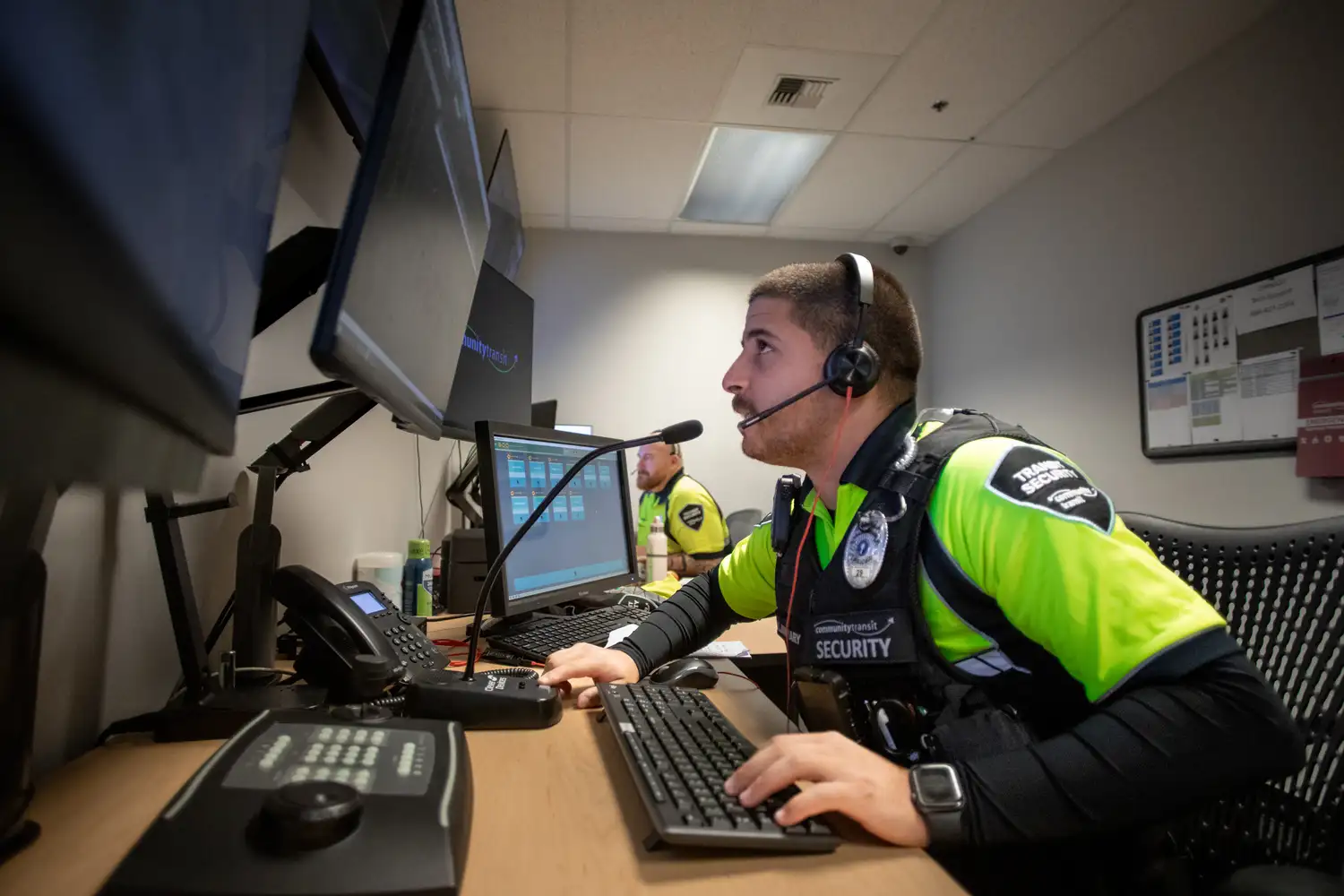
In July 2024, the Security Operations Center phone number was publicized to make our customers and employees feel empowered to advocate for their own safety and security. This provides a single point of contact for any security concerns or questions to streamline communications.
In 2024, the Safety Division published their first annual Workers’ Compensation and Occupational Safety Report. The report focuses on reviewing historical trends and identifying areas for strategic investment to reduce employee exposure to occupational hazards, injuries and workers’ compensation costs.
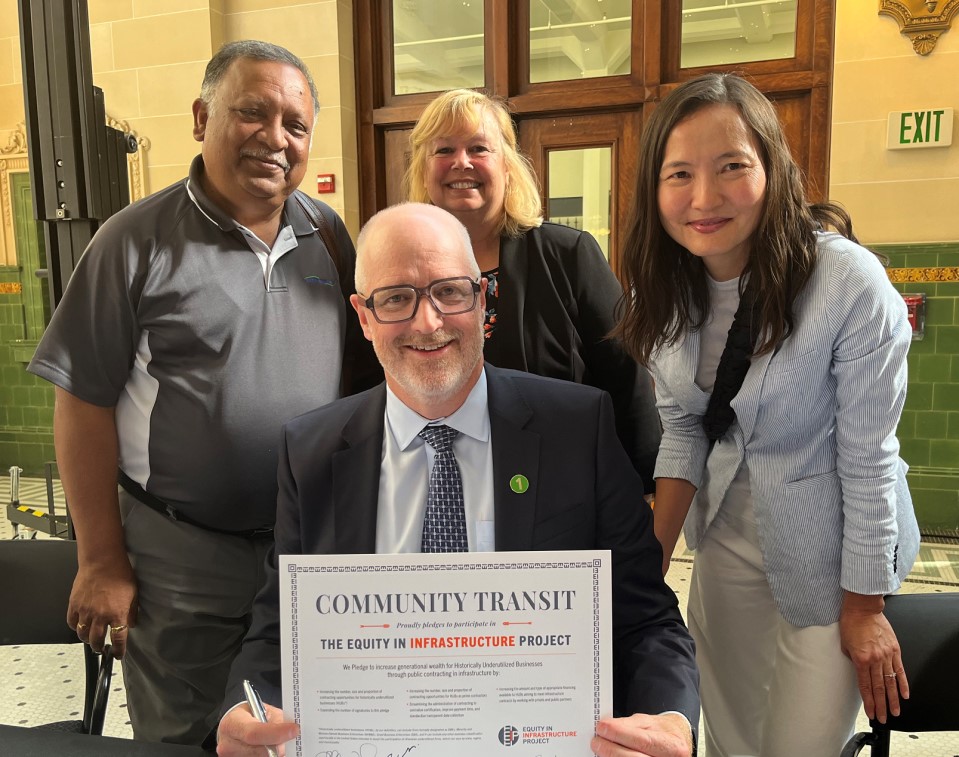
In September 2024, Community Transit pledged its support for the Equity in Infrastructure Project (EIP). The pledge, signed by CEO Ric Ilgenfritz, reflects the agency’s commitment to increasing the number, size, and proportion of contracts going to Historically Underutilized Businesses. Community Transit is proud to join this transformative effort alongside the Federal Transit Administration (FTA) and local partners including Sound Transit, City of Seattle, Port of Seattle, King County, and others.
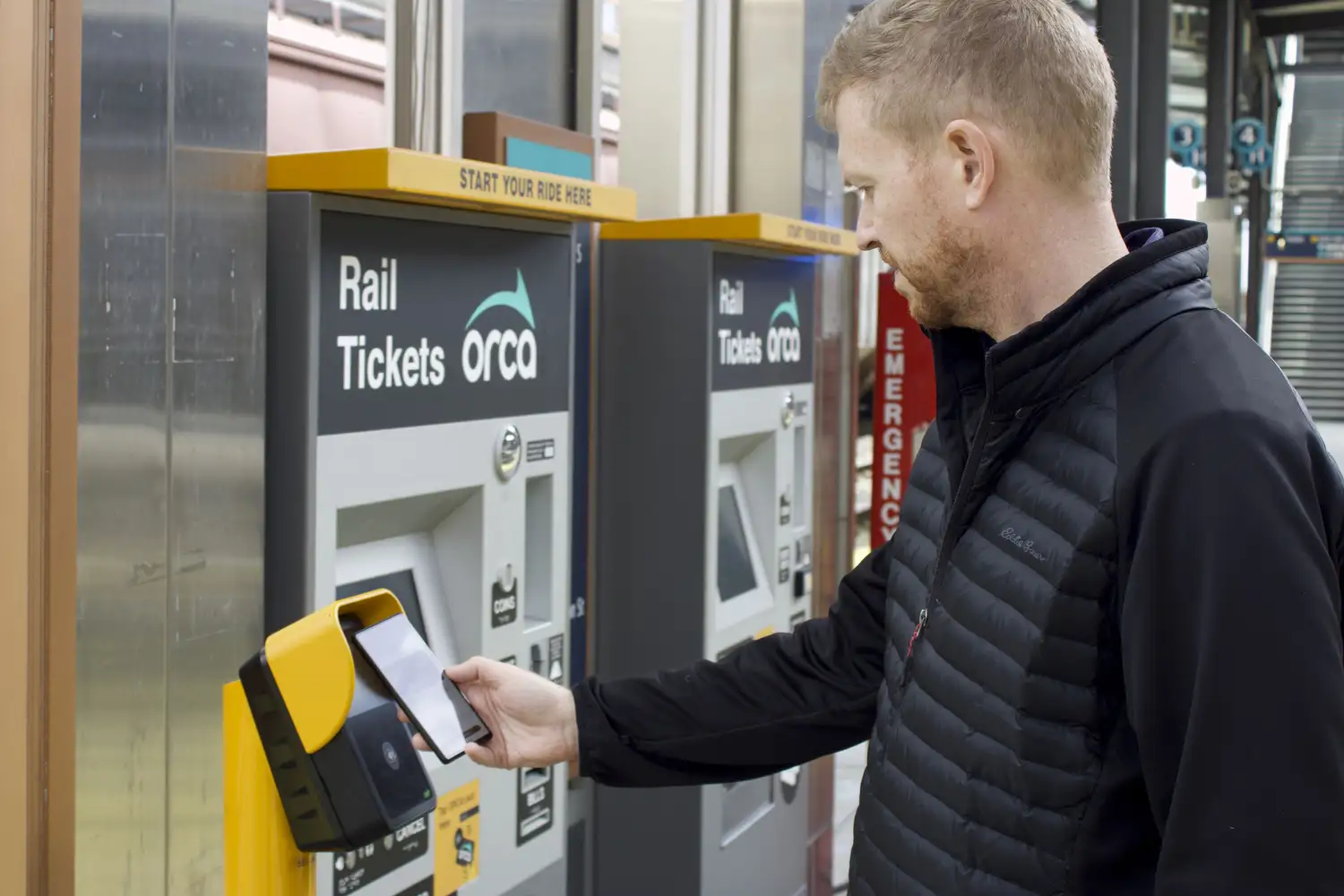
As of spring 2024, Android users can now use their phone instead of a physical card to pay fares, reducing the number of plastic ORCA cards used.
In Q4 2024, the Swift Program will begin installing new windscreens to improve security and weather protection at a subset of stations on the Swift Blue Line and Swift Green Line. Instead of fabricating new glass panes for these windscreens, the contractor for this project has been tasked with reusing the existing glass panes from the windscreens being removed which have the same spec to ensure compatibility of materials across lines and station types.
Integration of existing glass panes reduces Community Transit’s procurement costs for fabricating new materials, while reducing the environmental cost of producing more glass unnecessarily. Standardization of parts reduces long-term materials costs, storage costs, and work complexity for our staff.
With the Swift Orange Line launch, the Swift Program included a station redesign into the project which integrated digital kiosks with LCDs and overhead digital signs with full-color LEDs.
- Incorporating more flexible digital mediums allows Community Transit to reduce long-term labor resources to provide new/modified information to customers, which would otherwise become more cumbersome as the Swift network expands.
- Reduced paper waste from removal of paper maps in favor of digital screens.
In an effort to reduce our impact from printing and paper consumption, Community Transit actively works to find ways to reduce our paper use wherever possible.
Some of our paper-reduction efforts include:
- Paper records center clean up
Disposed of thousands of stored paper records and eliminated 100+ boxes of paper records according to our retention schedules (RCWs).
This clean-up reduced risk to the organization and lessened the number of paper records in the paper records center. This moves the needle on migrating from paper to digital records. - Paperless Facilities Shop
Installed workstations in the Maintenance Facilities Shop so staff could record work orders, track labor, and track parts in the company’s Enterprise Asset Management software.
This shift created a vast reduction in paper usage for the shop, better record accuracy and reporting & analysis capabilities. - Department Paper Reduction
The Transportation Department has eliminated printed paper from weekly team meetings and the Dispatch run card drawer. Previously, event reports from Coach Operators were printed and distributed among Transportation Supervisors, Managers, and Administrative Staff. Additionally, hundreds of run cards were printed in advance for Coach Operators to use whenever needed.
This effort has produced a significant reduction in paper usage. Event reports are now accessed through a shared drive and via email before meetings. Run cards are printed only as needed for Coach Operators. - Discontinuation of printed Bus Plus schedule books
In the past, Community Transit used to publish a 250-page rider information and bus schedule book called Bus Plus. The book was printed twice a year. At its height, approximately 100,000 copies were printed for each service change. We first reduced print run as an environmental measure, then eliminated printing these books altogether during pandemic as service was changing too rapidly for books to be valid.- Eliminating printing of these 200,000 250-page books each year, reduced our paper waste by 50,000,000 pages per year!
- Cost savings from this project was about $200,000 annually.
